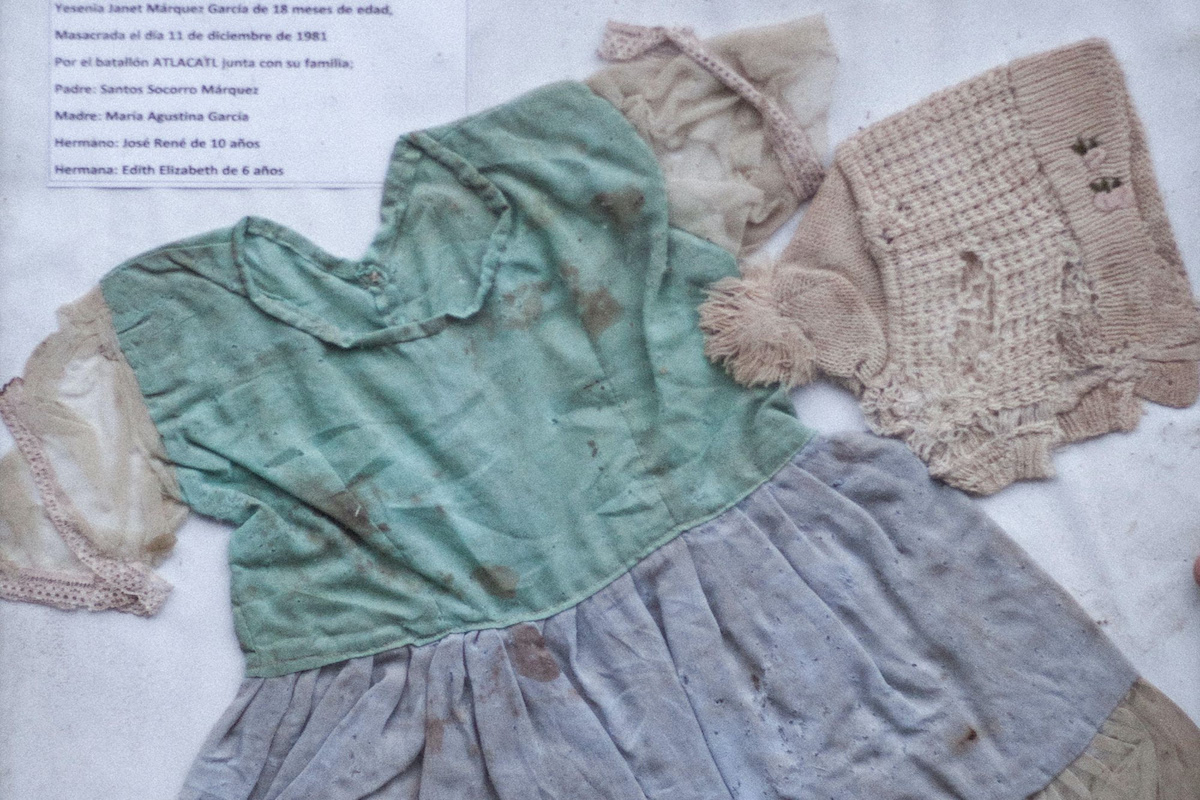

The remains of Yesenia Jane Márquez García, assassinated at just 18 months old by the Atlacatl Battalion during the massacre at El Mozote on December 11, 1981. (Photo: Víctor Peña/El Faro)
The criminal case against the alleged culprits of the El Mozote massacre during the Salvadoran Civil War is set to resume this week, with the sworn testimony of two experts crucial to pinning down the roles of officers from the U.S.-trained army battalion implicated in the slaying of almost 1,000 civilians across seven villages around and including El Mozote, Morazán in December of 1981.
El Faro will livestream the entirety of this week’s proceedings from the courtroom in San Francisco Gotera, which you can watch on Facebook, as well as live English-language highlights on El Faro English’s Twitter account. We will also offer brief bilingual post-hearing analysis at the end of every day of the hearings, written daily recaps, and an end-of-week round-up.
This week is expected to be a crucial test for the strength of Salvadoran prosecutors’ case against atrocities mired in impunity for four decades. The existence of the massacres in the El Mozote area has been thoroughly substantiated in court; now, prosecutors will try to attribute individual responsibility for planning and carrying out the killings. The strength of the evidence presented this week, in this final phase of discovery, will indicate the potential development of the rest of the case this year.
The first expert witness will be Professor Terry Karl, a Stanford University political scientist and globally preeminent expert on Salvadoran history. Her testimony proved key in other trials of civil war atrocities, including the one held in Fresno for the 1980 murder of Monsignor Óscar Romero, the 1989 Jesuit Massacre tried in Spain, and the cases in the United States against former defense ministers José Guillermo García and Eugenio Vides Casanova. The second, Clever Pino, is a Peruvian expert on Latin American militaries who in 2002 testified in the trial for the 1990 murder of Guatemalan anthropologist Myrna Mack.
Karl and Pino have submitted reports to the court to serve as the basis for questioning, starting with Karl. She is expected to conclude in court that the Salvadoran High Command was responsible for planning and carrying out Operation Rescue, which culminated in the El Mozote massacre, as well as that the massacre itself was jointly ordered by the High Command, the commander of the Third Brigade, and the commander of the Atlacatl Battalion. It’s also anticipated that she will assert that the High Command knew of and did nothing to investigate or punish the culprits of the massacre and that there was a systematic government cover-up involving both the Salvadoran and United States governments.
This week’s hearings have been postponed multiple times, due to both pandemic-related travel restrictions and legal delays. This will be the first time that expert witnesses are summoned to the courtroom in a year, given that the pandemic interrupted legal proceedings across the country in the first half of 2020.
In the second half of the year, Judge Jorge Guzmán, assigned to the case, publicly squared off with President Bukele as he attempted unfruitfully, on five occasions in various barracks, to conduct independent inspections of military archives pertaining to the massacre. Due to the ongoing reticence of successive Salvadoran administrations to require the Armed Forces to hand over internal documents relating to El Mozote, Karl is expected to draw key support from declassified United States documents.
The witnesses will take the stand as Judge Guzmán is fighting off attacks from different quarters. Since March, the military’s defense team filed two motions for his recusal; the Attorney General filed another, which it has since dropped.
The judge will nonetheless move forward with the depositions, as the law permits, though the defense’s two motions for recusal have yet to be resolved. If the court of accounts finds reason to recuse Guzmán, this week’s audiences will be null and void. Judge Guzmán is taking a gamble.
For those less familiar with the massacre at El Mozote, we are sharing the English-language version of one of the most recent projects in El Faro’s two-decades-long coverage of the case. Listen to the survivors tell their own stories. Thanks for reading, and if you have benefited from our reporting, be sure to pass it along.
***
El Faro English is a project from the award-winning Central American media outlet, El Faro, which focuses on hard-hitting investigations, culture, and analysis from Central America and beyond. In addition to translating reporting from El Faro, we publish original investigations and opinion articles and translate stories from partner media outlets throughout the region about migration, politics, culture, historical memory, violence and more from Central American communities in the region, Mexico, Europe, and the United States. Twitter: @elfaroenglish. To subscribe to El Faro English’s letter, subscribe here.


